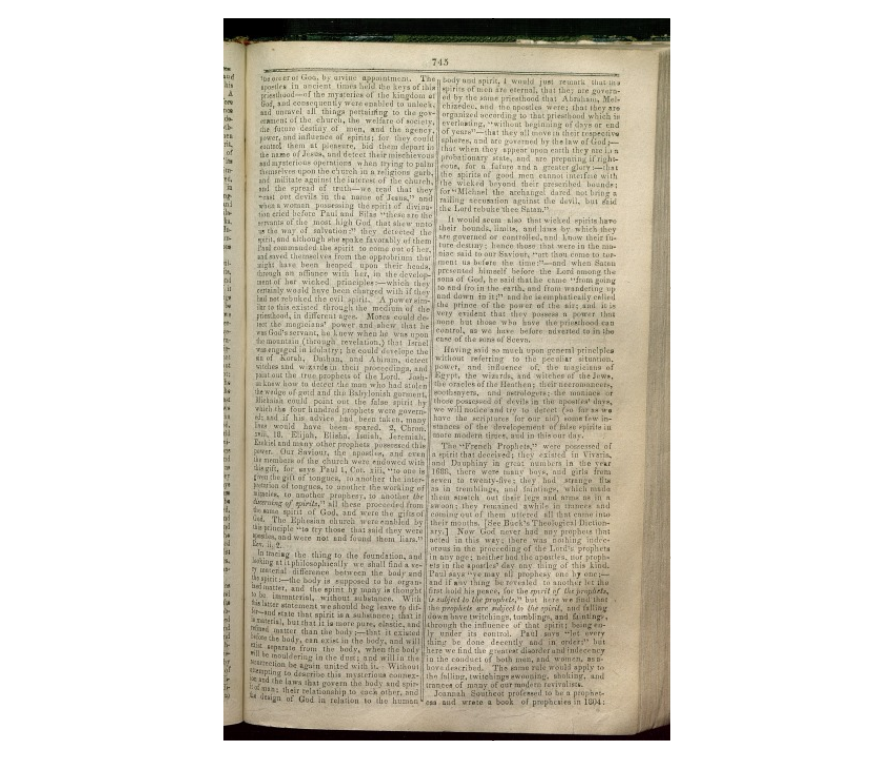W. W. Phelps, in an article in the Times and Seasons, quotes from Jude 9, a text that subordinates Michael to "the Lord."
- Type
- Periodical
- Hearsay
- Direct
- Reference
W. W. Phelps, "Try the Spirits," Times and Seasons 3, no. 11 (April 1, 1842): 745, The Joseph Smith Papers website, accessed February 15, 2023
- Scribe/Publisher
- Times and Seasons
- Audience
- Members of The Church of Jesus Christ of Latter-day Saints
- Transcription
The apostles in ancient times held the keys of this priesthood—of the mysteries of the kingdom of God, and consequently were enabled to unlock, and unravel all things pertaining to the government of the church, the welfare of society, the future destiny of men, and the agency, power, and influence of spirits; for they could control them at pleasure, bid them depart in the name of Jesus, and detect their mischievous and mysterious operations when trying to palm themselves upon the church in a religious garb, and militate against the interest of the church, and the spread of truth—we read that they “cast out devils in the name of Jesus,” and when a woman possessing the spirit of divination cried before Paul and Silas “these are the servants of the most high God that shew unto us the way of salvation:” they detected the spirit, and although she spake favorably of them Paul commanded the spirit to come out of her, and saved themselves from the opprobrium that might have been heaped upon their heads, through an affiance with her, in the development of her wicked principles:—which they certainly would have been charged with if they had not rebuked the evil spirit. A power similar to this existed through the medium of the priesthood, in different ages. Moses could detect the magicians’ power and shew that he was God’s servant, he knew when he was upon the mountain (through revelation,) that Israel was engaged in idolatry; he could develope the sin of Korah, Dathan, and Abiram, detect witches and wizards in their proceedings, and point out the true prophets of the Lord. Joshua knew how to detect the man who had stolen the wedge of gold and the Babylonish garment, Michaiah could point out the false spirit by which the four hundred prophets were governed; and if his advice had been taken, many lives would have been spared. 2, Chron. xviii, 18. Elijah, Elisha, Isaiah, Jeremiah, Ezekiel and many other prophets possessed this power. Our Saviour, the apostles, and even the members of the church were endowed with this gift, for says Paul 1, Cor. xiii, “to one is given the gift of tongues, to another the interpretation of tongues, to another the working of miracles, to another prophesy, to another the discerning of spirits,” all these proceeded from the same spirit of God, and were the gifts of God. The Ephesian church were enabled by this principle “to try those that said they were apostles, and were not and found them liars.” Rev. ii, 2.
In tracing the thing to the foundation, and looking at it philosophically we shall find a very material difference between the body and the spirit:—the body is supposed to be organized matter, and the spirit by many is thought to be immaterial, without substance. With this latter statement we should beg leave to differ—and state that spirit is a substance; that it is material, but that it is more pure, elastic, and refined matter than the body;—that it existed before the body, can exist in the body, and will exist separate from the body when the body will be mouldering in the dust; and will in the resurrection be again united with it. Without attempting to describe this mysterious connexion and the laws that govern the body and spirit of man; their relationship to each other, and the design of God in relation to the human body and spirit, I would just remark that the spirits of men are eternal, that they are governed by the same priesthood that Abraham, Melchizedec, and the apostles were; that they are organized according to that priesthood which is everlasting, “without beginning of days or end of years”—that they all move in their respective spheres, and are governed by the law of God;—that when they appear upon earth they are in a probationary state, and are preparing if righteous, for a future and a greater glory:—that the spirits of good men cannot interfere with the wicked beyond their prescribed bounds; for “Michael the archangel dared not bring a railing accusation against the devil, but said the Lord rebuke thee Satan.”
It would seem also that wicked spirits have their bounds, limits, and laws by which they are governed or controlled, and know their future destiny; hence those that were in the maniac said to our Saviour, “art thou come to torment us before the time:”—and when Satan presented himself before the Lord among the sons of God, he said that he came “from going to and fro in the earth, and from wandering up and down in it;” and he is emphatically called the prince of the power of the air; and it is very evident that they possess a power that none but those who have the priesthood can control, as we have before adverted to in the case of the sons of Sceva.
- Citations in Mormonr Qnas
The B. H. Roberts Foundation is not owned by, operated by, or affiliated with the Church of Jesus Christ of Latter-day Saints.

